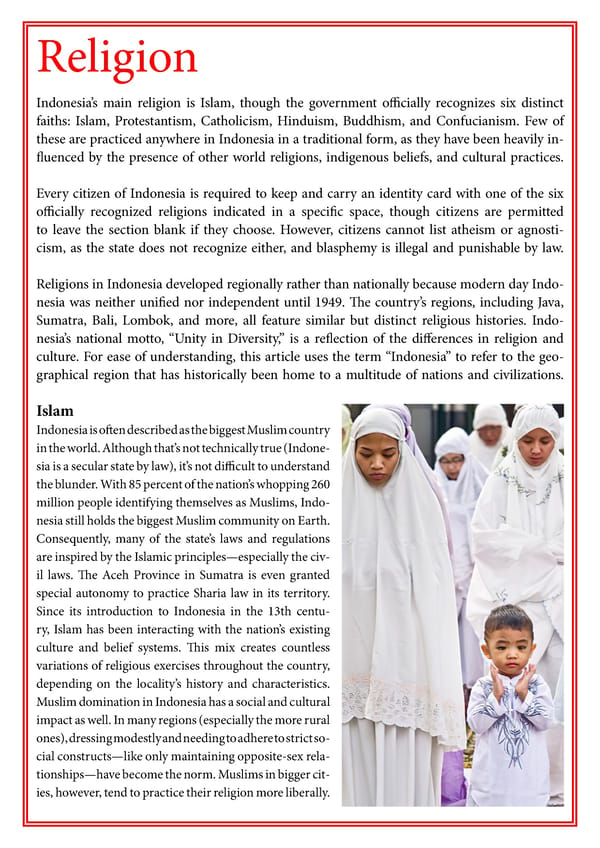Religion Indonesia’s main religion is Islam, though the government officially recognizes six distinct faiths: Islam, Protestantism, Catholicism, Hinduism, Buddhism, and Confucianism. Few of these are practiced anywhere in Indonesia in a traditional form, as they have been heavily in- fluenced by the presence of other world religions, indigenous beliefs, and cultural practices. Every citizen of Indonesia is required to keep and carry an identity card with one of the six officially recognized religions indicated in a specific space, though citizens are permitted to leave the section blank if they choose. However, citizens cannot list atheism or agnosti- cism, as the state does not recognize either, and blasphemy is illegal and punishable by law. Religions in Indonesia developed regionally rather than nationally because modern day Indo- nesia was neither unified nor independent until 1949. The country’s regions, including Java, Sumatra, Bali, Lombok, and more, all feature similar but distinct religious histories. Indo- nesia’s national motto, “Unity in Diversity,” is a reflection of the differences in religion and culture. For ease of understanding, this article uses the term “Indonesia” to refer to the geo- graphical region that has historically been home to a multitude of nations and civilizations. Islam Indonesia is often described as the biggest Muslim country in the world. Although that’s not technically true (Indone- sia is a secular state by law), it’s not difficult to understand the blunder. With 85 percent of the nation’s whopping 260 million people identifying themselves as Muslims, Indo- nesia still holds the biggest Muslim community on Earth. Consequently, many of the state’s laws and regulations are inspired by the Islamic principles—especially the civ- il laws. The Aceh Province in Sumatra is even granted special autonomy to practice Sharia law in its territory. Since its introduction to Indonesia in the 13th centu- ry, Islam has been interacting with the nation’s existing culture and belief systems. This mix creates countless variations of religious exercises throughout the country, depending on the locality’s history and characteristics. Muslim domination in Indonesia has a social and cultural impact as well. In many regions (especially the more rural ones), dressing modestly and needing to adhere to strict so- cial constructs—like only maintaining opposite-sex rela- tionships—have become the norm. Muslims in bigger cit- ies, however, tend to practice their religion more liberally.
 Visual Guide Indonesia Page 9 Page 11
Visual Guide Indonesia Page 9 Page 11